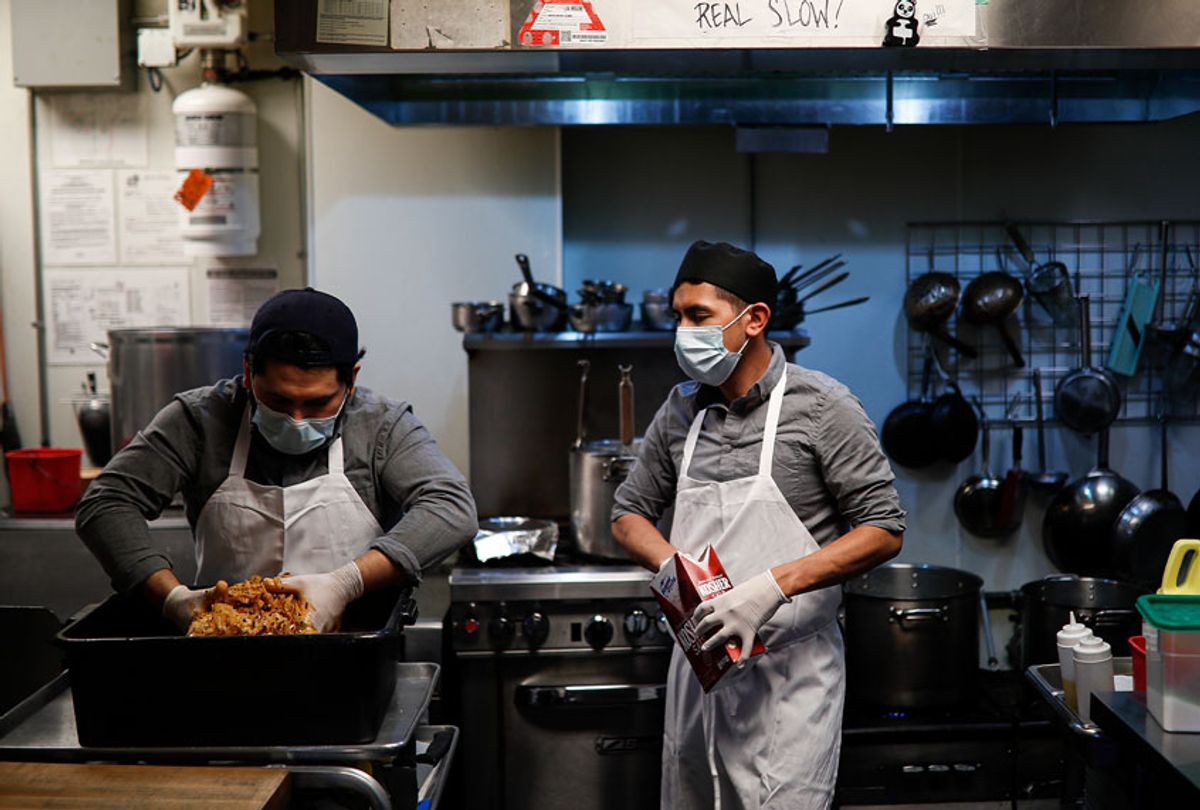Scientists and workers' rights advocates were among those late Wednesday who denounced the Biden administration's new workplace safety rules regarding the Covid-19 pandemic, which were unveiled months later than expected and which the Labor Department made enforceable only for healthcare settings—leaving grocery store employees, manufacturing workers, and others vulnerable to the continuing public health crisis, critics said.
At a Wednesday hearing of the House Education and Labor Committee, Labor Secretary Marty Walsh told lawmakers that the Occupational Safety and Health Administration's (OSHA) final Covid-19 Emergency Temporary Standard (ETS) will apply only to healthcare workplaces, requiring those employers "to provide their workers with a safe and healthful workplace free from recognized hazards that are causing or likely to cause death or serious physical harm."
"Except for workplace settings covered by OSHA's ETS and mask requirements for public transportation, most employers no longer need to take steps to protect their workers from Covid-19 exposure in any workplace, or well-defined portions of a workplace, where all employees are fully vaccinated," read OSHA's new guidelines, updated on Thursday.
"Employers should still take steps to protect unvaccinated or otherwise at-risk workers in their workplaces, or well-defined portions of workplaces," the guidance says, but as HuffPost reported, this portion of the guidance is "essentially voluntary."
Walsh told members of Congress the Labor Department "tailored a rule that reflects the reality on the ground, the success of all government vaccination efforts, plus the latest guidance from the CDC on the changing nature of the pandemic."
"Science tells us that healthcare workers, particularly those who have come into regular contact with people either suspected of having or being treated for Covid-19, are most at risk," said Walsh.
"Actually, science tells us highest risk [is] in food/agriculture, manufacturing, facilities, [and] transportation/logistics," tweeted Dr. Kirsten Bibbins-Domingo, chair of the Department of Epidemiology and Biostatistics at the University of California San Francisco.
A study done by researchers at the university earlier this year showed that line cooks, warehouse employees agriculture workers, bakers, and construction workers have the highest rates of mortality from Covid-19.
In addition to excluding many vulnerable workers from the ETS, the Biden administration released the guidance weeks after it was expected in March.
The Labor Department "missed a crucial opportunity," said the National Council of Occupational Safety and Health, to protect workers that President Joe Biden had previously criticized former President Donald Trump for not safeguarding with an ETS.
"This is a new insult on top of the injuries, illnesses, and deaths suffered by frontline workers and their families," said Jessica Martinez, the group's co-director. "Vaccines have not reached all workers, and Covid-19 is not over."
Journalist Paul Blest denounced the new guidelines as "horrible" and "embarrassing."
Oxfam America said the "long-overdue" ETS represents "a shameful failure of leadership by an administration that was elected on a platform of standing for the needs of all working people."
"We've learned over decades that employers, especially in low wage industries, rarely choose to prioritize their workers' safety; we need government to mandate actions that safeguard lives and well-being," said Gina Cummings, vice president of alliances, advocacy, and policy for the group. "To rely only on unenforceable guidance is almost certainly to condemn workers to face exposure to this potentially deadly virus."

Shares